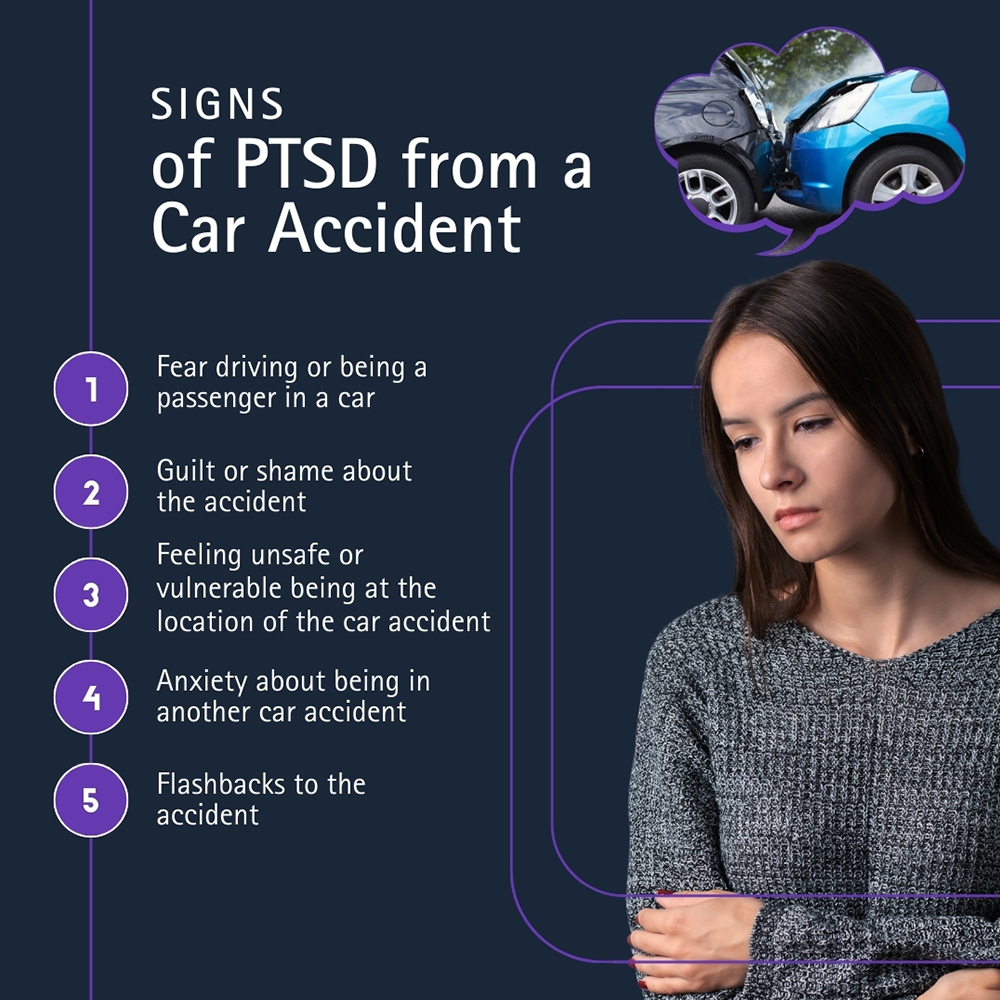
A car accident can have different effects on people. You can get in a car accident with a friend and have no mental health effects. While your friend feels traumatized and can’t go back to the same road without feeling anxious. What causes trauma is not the event itself. It is instead the negative beliefs that you adopt as a result of this event.
For example, after a car accident, PTSD can result in beliefs such as:
- “Cars are not safe.”
- “This road is dangerous.”
- “I may get into another car accident at any time.”
- “I have no control on the road.”
- “It’s all my fault. I should have been more careful.”
- “My life will never be the same again.”
- “I’m afraid to get behind the wheel again.”
These negative beliefs cause us distress. The key to trauma healing after a car accident is to prove these negative beliefs false and identify true positive beliefs.
How Long Does PTSD Last After a Car Accident?
The duration of PTSD after a car accident can vary from person to person. Not everyone who gets into a car accident will experience PTSD. Some people may recover from PTSD quickly, especially with treatment while others may experience PTSD symptoms for years.
What Are Signs of PTSD From a Car Accident?
PTSD symptoms after a car accident include:
- Fear driving or being a passenger in a car
- Guilt or shame about the accident
- Feeling unsafe or vulnerable being at the location of the car accident
- Anxiety about being in another car accident
- Flashbacks to the accident
PTSD symptoms from a car accident are similar to those of any other traumatic event and can be decreased or completely alleviated with PTSD therapy.

Embrace Healing The Power of Trust in Therapeutic Relationships
“In my experience, the most effective aspect of therapy is the therapeutic relationship. Establishing trust between a client and clinician is the first step to healing.”
How Many People Have PTSD After a Car Accident?
The likelihood of getting PTSD after a car accident depends on the person. According to a study published in the Journal of Traumatic Stress, approximately 9% to 25% of individuals involved in car accidents develop PTSD.
Several factors may affect your risk for experiencing PTSD following a car accident such as:
- Past traumatic experiences
- Current stress level
- Support system present in your life
- Availability of coping mechanisms
- Severity of the accident
If you or someone you know is experiencing PTSD from a car accident it is important to seek professional help from a therapist specializing in trauma. PTSD from a car accident is treatable. It is important to get the proper assessment, diagnosis, and treatment from a licensed professional clinician.
How Do You Treat PTSD After a Car Accident?
PTSD treatment after a car accident involves several steps such as:
- Your therapist will provide psychoeducation on somatic regulation and help you create habits for relaxation
- Identify the PTSD symptoms you experience
- Learn coping mechanisms
- Learn about cognitive distortions
- Identify the negative beliefs you have due to the car accident
- Reframe your negative beliefs into more positive/hopeful/ or neutral beliefs
You will be able to do all this and eliminate your PTSD symptoms with the help, guidance, and support of our therapists at the Trauma Therapy Center.
Does Therapy Help After a Car Accident?
Therapy after a traumatic car accident can help you begin to live life free from PTSD symptoms. Therapy can help you cope with the negative emotions you may be experiencing after the accident.
Therapy can help you:
- Process your experience and understand your emotions so they don’t overwhelm you
- Learn techniques to help you deal with the negative effects of the traumatic car accident such as nightmares, flashbacks, or anxiety
- Overcome your fears and begin to feel comfortable in the car again
- Develop coping skills to help you overcome your anxiety such as relaxation exercises, mindfulness techniques, or problem-solving skills
- Rebuild your confidence and feel more in control of your life
- Find support by creating a safe space to talk about your experience and feel your emotions
Remember, PTSD therapy after a car accident takes time. Be gentle with yourself, ask for support, and remember to practice self-care throughout your time in therapy.
How to Get Therapy After a Car Accident?
Getting therapy may take a series of steps including:
- Assess your needs: You don’t have to be able to picture your life after therapy, but it’s a good idea to determine some things you would like to improve on.
- Research therapists: You can ask for a referral from your primary care provider, friends, or family, or read reviews. Consider the therapist’s specialty, experience, and what is important to you in someone who you can be open and honest with.
- Collaborate: It’s important to share your honest thoughts, feelings, and opinions with your therapist regarding your treatment. A therapy session is your time and it’s necessary to ask for what you need.
- Engagement: Therapy only works if you attend sessions regularly. However, it does not work if you only attend. Engagement in therapy means being open, honest, and willing to try new things for your well-being.
Getting therapy is the first step to your healing journey and prioritizing your mental health.
What Kind of Therapist Do I Need for Car Accident Trauma?
For car accident trauma therapy it is important to see a therapist who specializes in PTSD treatment.
This can be a licensed psychotherapist of any kind such as:
- Clinical Social Worker
- Mental Health Counselor
- Psychologist
If you believe you have negative psychological effects after a car accident contact our office for an assessment and trauma therapy.
Don’t let car accident-related PTSD control your life any longer. Here in West Palm Beach our dedicated therapists and proven techniques like REBT, CBT, and EMDR, you can break free from the grip of trauma. Begin your journey towards healing today and rediscover a brighter, joy-filled future. Contact us now to start your transformation.

